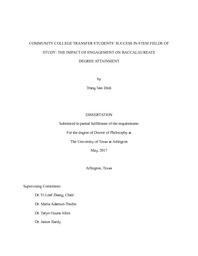| dc.description.abstract | This study focused on community college transfer students and sought to determine the extent to which their baccalaureate degree attainment in Science, Technology, Engineering, and Mathematics (STEM) fields of study can be predicted by their demographic characteristics, precollege academic preparation, and their engagement in a wide range of domains while in college. The study used data drawn from the Educational Longitudinal Study (ELS:2002) to examine the demographic background and college experiences of 1,761 community college transfer students.
Astin’s (1993) theory of involvement, or the Input-Environment-Output (I-E-O) model, was adopted as the guiding theoretical framework. In this study, the input variables included background characteristics (i.e., gender, race/ethnicity, socioeconomic status (SES)) and precollege academic preparation (grade point average (GPA) in high school and high school preparation in math and science). The environmental variables consisted of students’ 1) engagement with active learning experiences (i.e., using school library services for coursework and participation in the community-based project and the mentoring program); 2) interactions with faculty and advisors (i.e., talking with faculty about academic matters outside of class, meeting with advisor about academic plans, and research with faculty outside of program requirement); and 3) participation in enriching educational practices (i.e., internship, study abroad, culminating senior experience, and volunteer service). Finally, output (O) represented community college transfer students’ degree attainment in STEM. Quantitative analyses, including descriptive statistics, Chi-square tests, independent samples t-tests, and sequential logistic regression, were conducted to analyze the data.
A sequential logistic regression model was used to examine the background characteristics, precollege academic preparation, and college engagement variables that predict STEM baccalaureate attainment among community college transfer students. The results of this study suggest that the background and precollege characteristics, including race (being Asian) and high school GPA, and college engagement, including working on coursework at the library and participation in the community-based project, research project with faculty, and culminating senior experience were predictors of the baccalaureate degree attainment in STEM among community college transfer students.
It is imperative that higher education institutions including both community colleges and 4-year universities take efforts to 1) examine the experience of Asian students, 2) provide academic support and motivation to students with low academic performance in high school, and 3) create opportunities and promote students’ participation in the community-based project, research with faculty, and culminating senior experience. In addition, future studies could investigate the following topics, including 1) the college experiences and STEM degree attainment of transfer students against those of native students at the 4-year institution, 2) the experience of community college transfer students with school library, the community-based project, the research opportunity with faculty, and culminating senior project through in depth qualitative inquiry, 3) the experience of a cohort of community college beginners, and 4) students’ external demands and STEM choice. | |


